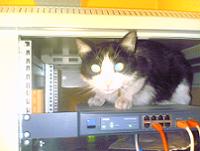Translation preprocessing software? Thread poster: Andreas Nieckele
|
|---|
Hello everyone,
Does anyone know if there is such a thing as translation "preprocessing" software?
Basically, what I would like to do is analyze a document before I start translating, so that it would list the most frequently used terms and expressions throughout the document and perhaps even compare it with a glossary and produce a list containing the terms and their equivalent translations. Preferably it should be possi... See more Hello everyone,
Does anyone know if there is such a thing as translation "preprocessing" software?
Basically, what I would like to do is analyze a document before I start translating, so that it would list the most frequently used terms and expressions throughout the document and perhaps even compare it with a glossary and produce a list containing the terms and their equivalent translations. Preferably it should be possible to export this list so I could discuss the terminology with the client beforehand, possibly saving me time later.
I already own Trados 2007 and as far as I know there is no such functionality. But maybe that's because I have a 64-bit system and couldn't get Multiterm to work (I managed to get Workbench and TagEditor working, however). I didn't see a similar function on Wordfast PRO also.
I appreciate any recommendations. Thanks. ▲ Collapse
| | | | Attila Piróth 
France
Local time: 01:41
Member
English to Hungarian
+ ...
| Term extraction | Oct 9, 2009 |
Wordfast's free add-on, PlusTools contains a function called "+Extract" that does exactly this: it extracts words and word combinations that occur several times in the document. It is customizable to some extent: you can set the maximum length of expressions to look for (e.g., max. 10 words), the minimum number of occurrence (occurs at least 3 times in the document), and you can also add a list of ignored stopwords ("and", "of", "to", "in", etc.). PlusTools uses a purely statistical approach the... See more Wordfast's free add-on, PlusTools contains a function called "+Extract" that does exactly this: it extracts words and word combinations that occur several times in the document. It is customizable to some extent: you can set the maximum length of expressions to look for (e.g., max. 10 words), the minimum number of occurrence (occurs at least 3 times in the document), and you can also add a list of ignored stopwords ("and", "of", "to", "in", etc.). PlusTools uses a purely statistical approach then, and presents a usually quite long list that has to be trimmed manually.
See this thread for more options and opinions.
Kind regards,
Attila ▲ Collapse
| | | | Samuel Murray 
Netherlands
Local time: 01:41
Member (2006)
English to Afrikaans
+ ...
Andreas Nieckele wrote:
Basically, what I would like to do is analyze a document before I start translating, so that it would list the most frequently used terms and expressions throughout the document and perhaps even compare it with a glossary and produce a list containing the terms and their equivalent translations.
AntConc, Tenka Text and Corsis are names of free programs (some of them on Sourceforge) that come to mind. ExtPhr32 can also do term extraction (not sure about doublebyte languages). Comparing your extracted list against a glossary can be done using certain UnxUtils tools but I can't remember which (and don't bother unless you're a tinkerer).
[Edited at 2009-10-09 18:24 GMT]
| | | | Uwe Schwenk (X)
Local time: 18:41
English to German
across conbtains actually a workflow for this, whereby the first step is to extract termnilogy candidates (you select by checking the words in the list presented and define whether its a term or a stop word).
The next step would be to translate the terms followed by the document translation, etc.
When you have the terms translated you can export them for example as CSV file and send to the client with the suggested translations.
Uwe
| | |
|
|
|
Attila Piróth wrote:
Wordfast's free add-on, PlusTools contains a function called "+Extract" that does exactly this: it extracts words and word combinations that occur several times in the document.
DVX may create so called Lexicon.
It is customizable to some extent: you can set the maximum length of expressions to look for (e.g., max. 10 words), the minimum number of occurrence (occurs at least 3 times in the document),
DVX behaves in a similar way, i.e. the string length may be limited before the analysis. After the analysis, you may delete the longest/shortest strings and the most/less frequent strings (both functions are configurable).
The list may be resolved automatically using the existing termbases/TMs.
and you can also add a list of ignored stopwords ("and", "of", "to", "in", etc.).
Function not available in DVX.
PlusTools uses a purely statistical approach then, and presents a usually quite long list that has to be trimmed manually.
True.
So why I always strip the less frequent segments (the minimal number of occurencies vary depending of the project size).
DVX is considerably faster than +Extract.
Cheers
GG
[Edited at 2009-10-10 09:08 GMT]
| | | | | Multiterm Extract | Oct 10, 2009 |
Andreas Nieckele wrote:
I already own Trados 2007 and as far as I know there is no such functionality. But maybe that's because I have a 64-bit system and couldn't get Multiterm to work [/quote]
A terminology extraction feature is available in Multiterm Extract which must be purchased separately.
BTW.
The 64-bit issue was partially fixed in the newest Trados releases, AFAIK.
A workaround for the older versions was published somewhere on Proz, search the archives.
Cheers
GG
[Edited at 2009-10-10 09:08 GMT]
| | | | Simon Cole 
United Kingdom
Local time: 00:41
Member (2008)
French to English
Trados Studio 2009 does exactly this as part of a Batch Task - Analyse File(s). You can specify how many times the segment repeats, etc. The extracted segments can be pre-translated and added to the TM before hitting the main document. As a T2007 user, the upgrade costs a lot less than buying the full application.
Unless you've been in a cave since June, you will of course be aware of debate here and elsewhere about the stability of T2009 - I have managed to tame it a bit by avoid... See more Trados Studio 2009 does exactly this as part of a Batch Task - Analyse File(s). You can specify how many times the segment repeats, etc. The extracted segments can be pre-translated and added to the TM before hitting the main document. As a T2007 user, the upgrade costs a lot less than buying the full application.
Unless you've been in a cave since June, you will of course be aware of debate here and elsewhere about the stability of T2009 - I have managed to tame it a bit by avoiding certain practices that provoke crashes (adding terms to a Termbase; using too many keyboard shortcuts quickly in succession; accidentally hitting Ctrl instead of Shift while typing, which can invoke any shortcut...). Still looking forward to release of functional SP1. ▲ Collapse
| | | | | Subsegment level | Oct 10, 2009 |
Simon Cole wrote:
Trados Studio 2009 does exactly this as part of a Batch Task - Analyse File(s).
No, T2009 Studio does not this in any serious way.
I.e. we discuss here the preprocessing at the subsegment level.
Of course, theorically, you can export frequent segments, resolve 'em and use the AutoSuggest creator but you must isolate at least 25000 segments... not easy...
Cheers
GG
| | |
|
|
|
claude
Thailand
Local time: 01:41
English to French
| Textanz and word macros | Oct 12, 2009 |
I found a small tool called textanz which does the same as some of the tools previously mentioned, i.e. find repetitions and sort them by word numbers or frequency.
But as I worked a long time on specialized domains and specific documents (patents) I created some basic macros in Word doing some "search/replace" jobs and where the replaced words appeared in red. It is a good preparation before using some document analysis tool as all the "and, or, is, are, with, before, after, containing, c... See more I found a small tool called textanz which does the same as some of the tools previously mentioned, i.e. find repetitions and sort them by word numbers or frequency.
But as I worked a long time on specialized domains and specific documents (patents) I created some basic macros in Word doing some "search/replace" jobs and where the replaced words appeared in red. It is a good preparation before using some document analysis tool as all the "and, or, is, are, with, before, after, containing, comprising, it is preferred that, furthermore, etc." and many expressions often found in these documents were already translated. After some time, it got quite handy as it was a perfect complement of specific analysis.
I guess in some other context, software for example, you would place in this kind of macro all the "click", "press button", "to open". ▲ Collapse
| | | | To report site rules violations or get help, contact a site moderator: You can also contact site staff by submitting a support request » Translation preprocessing software? | Pastey | Your smart companion app
Pastey is an innovative desktop application that bridges the gap between human expertise and artificial intelligence. With intuitive keyboard shortcuts, Pastey transforms your source text into AI-powered draft translations.
Find out more » |
| | Protemos translation business management system | Create your account in minutes, and start working! 3-month trial for agencies, and free for freelancers!
The system lets you keep client/vendor database, with contacts and rates, manage projects and assign jobs to vendors, issue invoices, track payments, store and manage project files, generate business reports on turnover profit per client/manager etc.
More info » |
|
| | | | X Sign in to your ProZ.com account... | | | | | |










